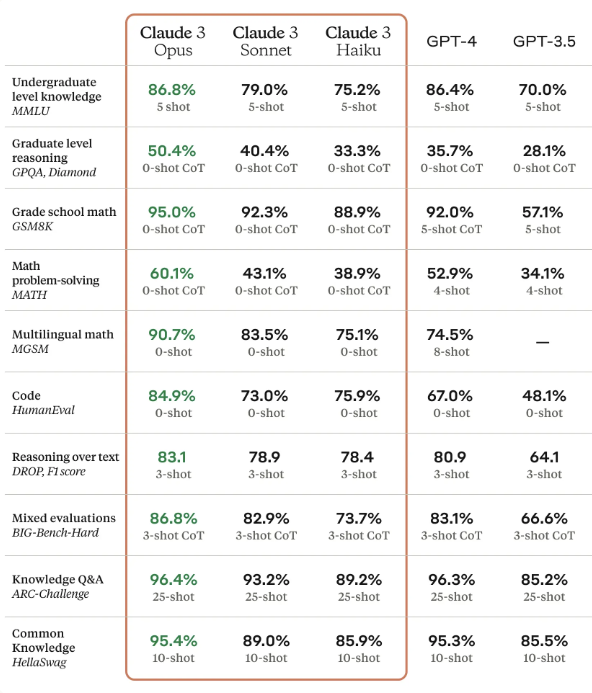OpenAI’s revolutionary artificial intelligence chatbot, ChatGPT, has opened a whole market of similar generative AI models.
It has also led to some of the biggest tech companies in the world joining the party, including Google’s Gemini. However, one in particular is becoming the most competitive of them all, and that’s Claude 3.
Its creators, Google-backed Anthropic, recently launched Claude 3, a trio of language models catering to different user needs and preferences.
It’s similar to market leader ChatGPT, which offers GPT-3.5 as a free-to-access product, whereas GPT-4 requires a monthly subscription and for access to more features and a more sophisticated language model. We’re also expecting GPT-5 to launch soon.
The Claude 3 family is the same. Three language models, all with varying levels of detail and sophistication. One is free, the other two require a subscription.
What is Claude 3 and what can it do?
The generative AI Claude family includes three models – Haiku, Sonnet and Opus. According to Anthropic, the state-of-the-art models offer ‘increasingly powerful performance, allowing users to select the optimal balance of intelligence, speed and cost for their specific application.’
Today we’re releasing Claude 3 Haiku, the fastest and most affordable model in its intelligence class.
Haiku is now available in the API and on https://t.co/uLbS2JNczH for Claude Pro subscribers. pic.twitter.com/uy25DFujdI
— Anthropic (@AnthropicAI) March 13, 2024
Opus is the most intelligent model and ‘outperforms’ its peers on most of the common evaluation benchmarks for AI systems. Anthropic’s website claims it has undergraduate-level expert knowledge and graduate-level expert reasoning, as well as being capable of performing basic mathematics. The AI company claims it ‘exhibits near-human levels of comprehension and fluency on complex tasks, leading the frontier of general intelligence.’
All models in the Claude family, though, display impressive abilities in analysis, forecasting, content creation, code generation and communicating in a variety of languages, including Spanish, Japanese and French.
Haiku is the fastest and most cost-effective model on the current market for its intelligence category, according to Anthropic. It is capable of reading and making sense of data and graph-dense research papers in under three seconds.
Meanwhile, Sonnet is ideal for tasks that require instant responses, such as knowledge retrieval or sales automation.
Anthropic says the Claude 3 family is capable of powering live customer chats, auto-completion and data extraction tasks, and can do all of the above in real-time. Meanwhile, all Claude 3 models are sophisticated enough to process a wide range of visual formats, including photos, graphs and diagrams.
How good is Claude 3?
Claude 3 uses a large set of complex, factual questions that are aimed at targeting known weaknesses in current models. The responses are categorized into correct answers, incorrect answers and admissions of uncertainty, where the model isn’t sure of the answer.
In Claude 3, Anthropic have been able to heavily improve the accuracy of their models compared to previous versions. It claims to have made a two-fold improvement in accuracy on challenging open-ended questions and reduced incorrect answers compared to Claude 2.1.
In a table on Anthropic’s website, each of the Claude 3 family is compared to GPT-4 AND GPT-3.5, and the results show far greater accuracy where Claude 3 is concerned.
Haiku, the least intelligent and costly member of the family, shows significantly higher accuracy levels over GPT-3.5, including in undergraduate-level knowledge, grade school math, coding, reasoning over text, knowledge Q&A and mixed evaluations.
The most intelligent and expensive of the trio, Opus, shows the same higher levels of accuracy over GPT-4, which is OpenAI’s equivalent. In fact, Opus is so accurate and sophisticated that it realized that it was being tested earlier this year, which was revealed by Anthropic prompt engineer, Alex Albert, on X.

How much does Claude 3 cost?
Claude on its own is free to use with usage limitations, while there’s a $20 monthly subscription for Claude Pro.
The Claude 3 API has three pricing levels that meet the levels of the three members of its family.
Haiku, described as ‘Light & Fast’ by Anthropic, is priced at an Input of $0.25 per million tokens and an output of $1.25 per million tokens.
The ‘Hard-wording’ Sonnet comes in at $3 per million tokens for input and $15 per million tokens for output.
Finally, the ‘Powerful’ Opus is priced at $15 per million tokens for input and $75 per million tokens for output.
Is Claude 3 better than ChatGPT?
Anthropic make a range of claims that its Claude 3 family is far better than OpenAI’s GPT offering, and the accuracy results suggest they have a solid case.
Tech.co recently did a detailed test between the two to determine which one comes up trumps, asking them 13 different questions designed to test reasoning, natural language processing, ethics, creativity, brainstorming and spreadsheet formulas.
The results were quite clear-cut. The analysts said Claude 3 produced better responses in seven of the tests, while ChatGPT won three. There were four ties, where the responses were pretty much the same.
Claude 3 provided better, more detailed, and better sophistication in its responses to ethical reasoning, creating product descriptions, some of its brainstorming, summarizing text, analyzing text, providing factual information and writing poems.
ChatGPT came out on top in creating spreadsheet formulas, composing an email and creative writing. It was deemed a tie in some of the brainstorming ideas questions, understanding natural language, personal advice and riddles and reasoning.
Given the level of accuracy, it’s easy to see why many would prefer Claude 3 over ChatGPT, but it all depends on what one’s needs are. For simple or basic prompts, it’s likely you won’t see a great deal of difference in responses between the two.
However, Claude 3 appears to be far more capable of accurately handling more complex and detailed tasks that would be more fitting in commercial or educational settings.
Featured Image: Anthropic

The post “What Is Claude 3? Is it better than ChatGPT?” by James Jones was published on 03/24/2024 by readwrite.com






































